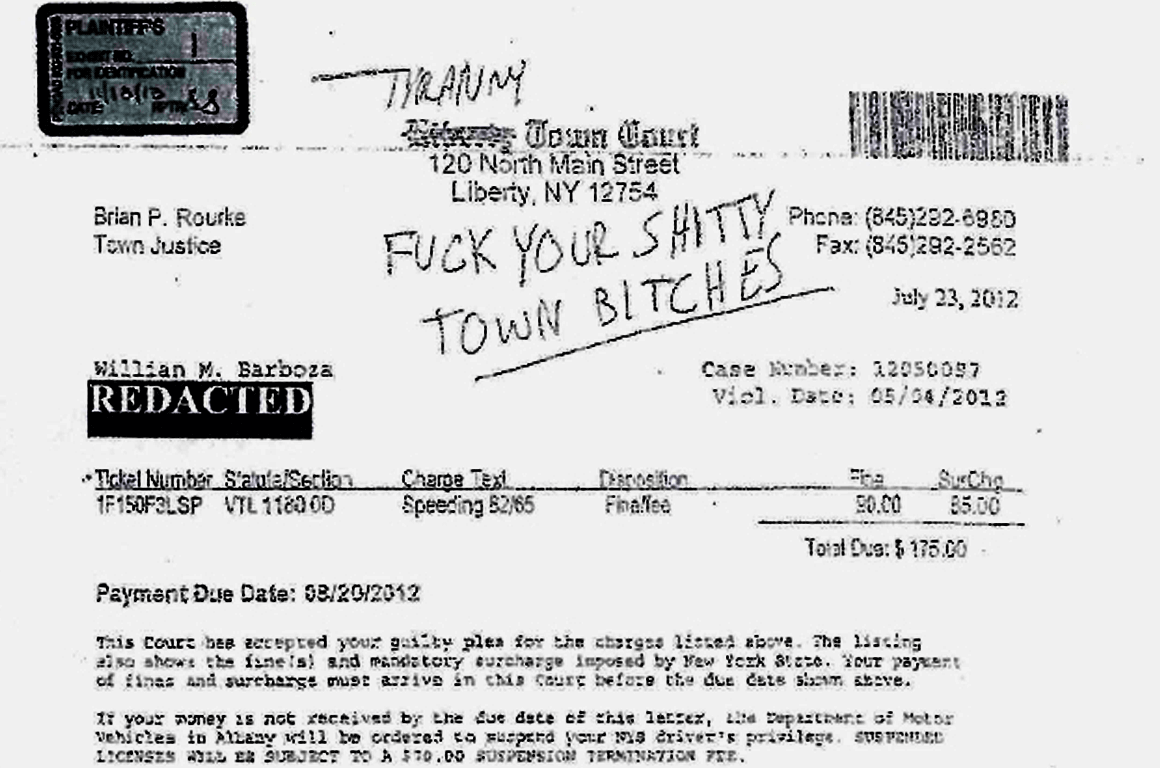Federal Judge Exonerates Man Who Wrote 'F*ck Your Sh*tty Town' On Speeding TicketCourt green lights lawsuit against Liberty, New York for arresting motorist who wrote a nasty note about a speeding ticket.TheNewspaper Sep. 17, 2015 |
Popular 
John Hagee Cheers Israel-Iran Battle as 'Gog and Magog War,' Will Lobby Congress Not to Deescalate

Right-Wing Media See Traffic Plummet in Wake of Algorithm Changes by Facebook, Google

Haaretz: "Israel Has Been Defeated - A Total Defeat"

NBC News: Biden 'Concerned' Israel is Trying to Drag America Into a War With Iran

Congress Introduces ADL-Backed 'Countering Antisemitism Act' to Police Online Speech
  A federal judge last week chastised Liberty, New York for arresting a man who wrote a profane comment while paying a speeding citation. On May 4, 2012, William Barboza, who was 22 at the time, was nabbed in a speed trap. Since he lives in Connecticut, he decided to pay rather than challenge the ticket. A federal judge last week chastised Liberty, New York for arresting a man who wrote a profane comment while paying a speeding citation. On May 4, 2012, William Barboza, who was 22 at the time, was nabbed in a speed trap. Since he lives in Connecticut, he decided to pay rather than challenge the ticket.So Barboza took the invoice he received from the Town of Liberty Justice Court, crossed out "Liberty" and wrote "Tyranny." At the top, he added an expletive-laden sentence in all caps that denigrated the town. Infuriated local officials rejected his payment, forcing him to drive two hours from his home to appear in person. To Barboza's surprise, he was placed under arrest in the middle of the court hearing. Sullivan County assistant district attorney Robert Zangala came up with the idea of charging Barboza with aggravated harassment because he "communicated with a person by mail in a manner likely to cause annoyance and alarm." Liberty police detectives Melvin Gorr and Steven D'Agata explained that he had no free speech rights because he offended people in the town clerk's office. Barboza was booked and released at 7pm after posting $200 bail. Barboza and the New York Civil Liberties Union sued to to have the "aggravated harassment" law overturned as a violation of free speech rights and to be compensated for the multiple hearings he had to attend to have the charge thrown out. "I do find the defendant's First Amendment rights were violated and defendants do not seem to seriously contest that plaintiff suffered a constitutional violation," US District Judge Cathy Seibel said. "That's the first prong of the qualified immunity test. I also find that plaintiff's right not to be arrested for the expression at issue was clearly established." The judge allowed Detectives D'Agata and Gorr off the hook because they were only following direct orders. "It would not be reasonable to expect officers to know that an action seemingly endorsed by the district attorney, assistant district attorneys, and a judge was not proper." Prosecutors generally have immunity for their decision to charge suspects, but Judge Seibel found that this protection did not apply to the decision to place Barboza under arrest without a warrant. "Zangala argues that he did not believe there was a constitutional bar to charging plaintiff with a crime. I don't quite see how one can at once believe that the First Amendment could be raised as a defense to the charge and at the same time be unaware of any constitutional impediments to bringing the charge. It almost sounds like D'Agata and [District Attorney James R.] Farrell knew the arrest was unconstitutional but were willing to go forward and wait and see if plaintiff would realize it." The judge did not have enough evidence on hand to tell whether there was a pattern of constitutional violations under which the town could be held liable. The case will now go to trial so a jury can decide whether the town is liable for failing to instruct its officers not to violate free speech rights. "I can't rule out the possibility that a rational juror might conclude that a properly trained officer would have rejected Zangala's request or at least opened a dialogue that might have avoided plaintiff's arrest," Judge Seibel ruled. Judge Seibel assigned the case to US Magistrate Judge Lisa M. Smith to arrive at a possible settlement without trial.  A copy of the decision transcript is available in a 500k PDF file at the source link below. Source: Barboza v. DAgata (US District Court, Southern District New York, 9/10/2015) |



